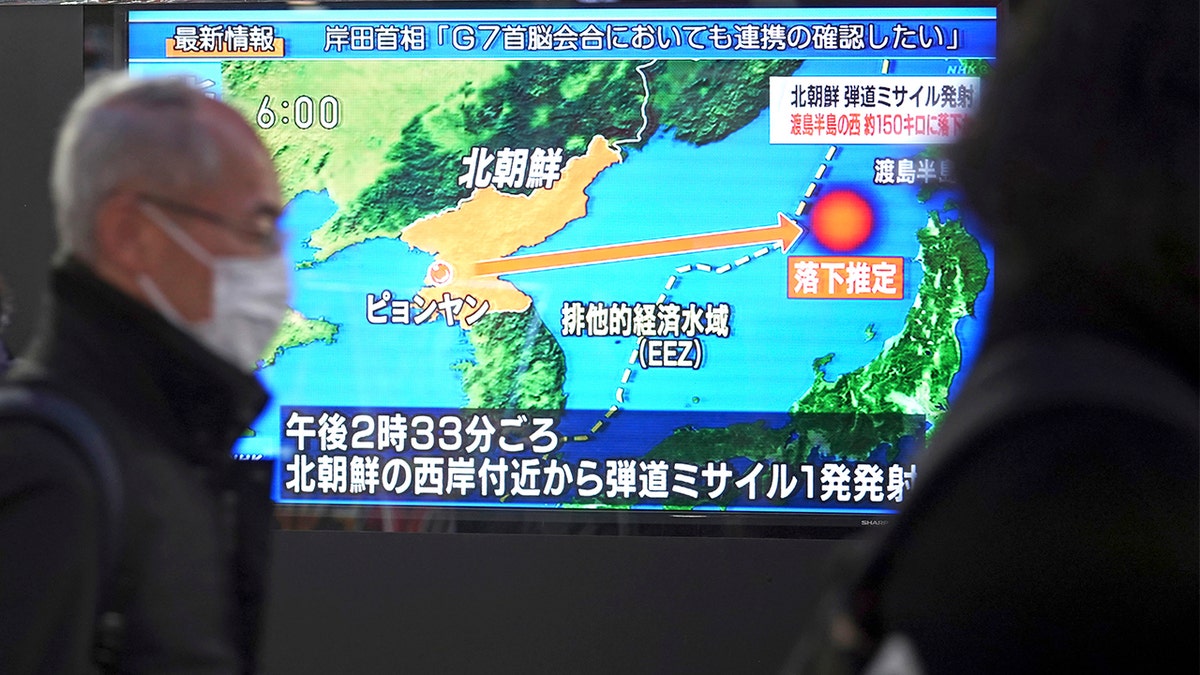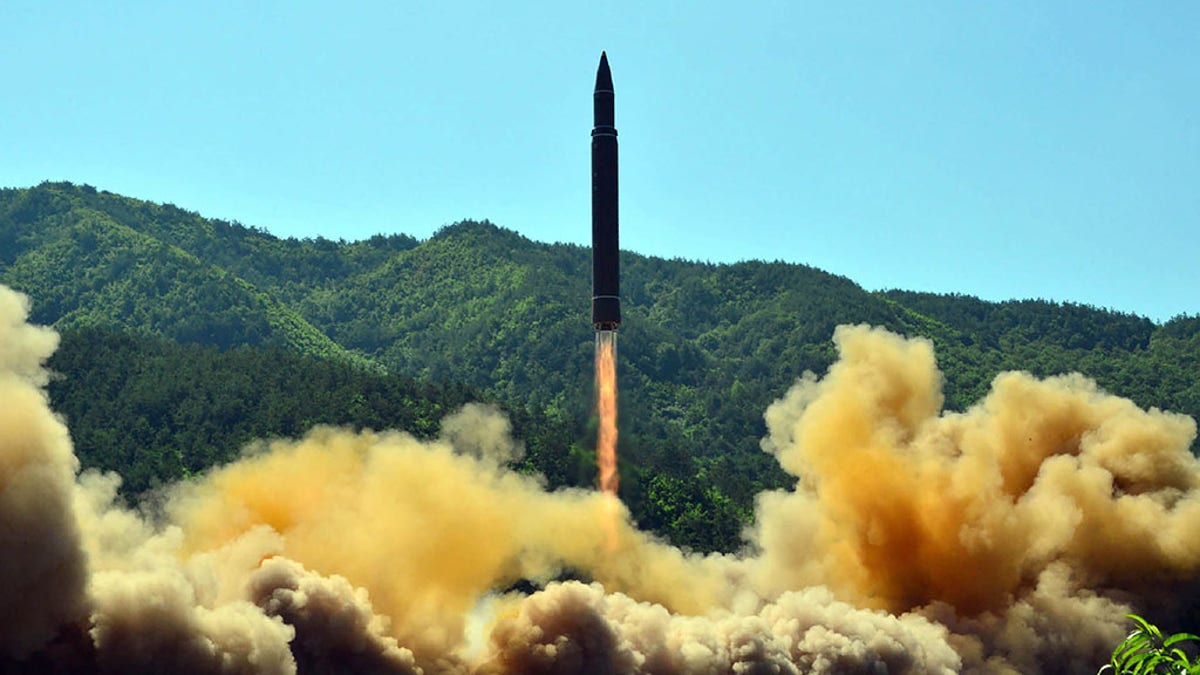Fox News Flash top headlines for March 23
Fox News Flash top headlines are here. Check out what's clicking on Foxnews.com.
The White House condemned North Korea for test-launching a long-range ballistic missile Thursday, weeks after the U.S. warned of new Pyongyang tests.
The U.S. government said earlier this month that North Korea tested a new intercontinental ballistic missile (ICBM) system Feb. 26 and March 4.
NORTH KOREA TESTS NEW ICBM MISSILE SYSTEM IN 'SERIOUS ESCALATION,' US OFFICIAL SAYS
Japan's Vice Defense Minister Makoto Oniki said the missile, which reached a maximum altitude of 3,728 miles, was possibly a new type of ICBM. Japan's coast guard, which warned vessels in nearby waters about the potential for falling objects, said it believed the missile flew about an hour before landing in waters outside the country's exclusive economic zone.
"This launch is a brazen violation of multiple UN Security Council resolutions and needlessly raises tensions and risks destabilizing the security situation in the region," White House press secretary Jen Psaki said. "This action demonstrates that the DPRK continues to prioritize its weapons of mass destruction and ballistic missile programs over the well-being of its people."

People walk along a sidewalk past a TV displaying a news program on North Korea's missile launch Thursday, March 24, 2022, in Tokyo. (AP Photo/Eugene Hoshiko)
The White House urged "all countries to hold the DPRK accountable for such violations and call on the DPRK to come to the table for serious negotiations."
"The door has not closed on diplomacy, but Pyongyang must immediately cease its destabilizing actions," Psaki said. "The United States will take all necessary measures to ensure the security of the American homeland and Republic of Korea and Japanese allies."
The new ICBM system was originally unveiled during the Korean Workers Party parade Oct. 10, 2020, and again in the Defense Exhibition in Chung Young in October 2021, the official said Thursday. The 2022 launches did not demonstrate ICBM range or capability but were likely aimed at testing elements of the new system, a senior administration official said earlier this month.
The senior administration official, at the time, predicted a future launch at "full range," which may be disguised as a space launch.
BIDEN ADMIN CONDEMNS NORTH KOREA MISSILE LAUNCH, SEEKS 'SERIOUS AND SUSTAINED DIPLOMACY' WITH DPRK
Earlier this month, U.S. Indo-Pacific Command ordered "intensified" intelligence surveillance and reconnaissance in the Yellow Sea, the official said. The U.S. Indo-Pacific Command also added "enhanced readiness among our ballistic missile defense forces in the region."
North Korea in January fired what appeared to be its most powerful missile since President Biden took office, a move senior U.S. officials described at the time as concerning and "increasingly destabilizing."
The Japanese and South Korean militaries said the January missile was launched on a high trajectory, apparently to avoid the territorial spaces of neighbors, reached a maximum altitude of 1,242 miles and traveled 497 miles before landing in the sea.
The flight details suggested North Korea tested its longest-range ballistic missile since 2017, when it flew ICBMs that demonstrated the potential to reach the U.S.

This picture taken on July 4, 2017, and released by North Korea's official Korean Central News Agency (KCNA) on July 5, 2017, shows the successful test-fire of the intercontinental ballistic missile Hwasong-14 at an undisclosed location. (STR/AFP via Getty Images)
North Korea completed more missile tests in January than it did in all of 2021, alarming South Korean officials who worry about its northern neighbor's intentions.
North Korea in January attempted to justify its testing activity as an exercise of its right to self-defense. It has threatened stronger action after the Biden administration imposed fresh sanctions following two tests of a purported hypersonic missile in early January.
In its 2022 annual threat assessment, the U.S. intelligence community warned of North Korea’s "continued development of ICBMs" and its commitment to expanding the country’s nuclear weapons arsenal, as well as continuing ballistic missile research and development.
North Korea’s actions in January appeared to be moves in "laying the groundwork for an increase in tensions that could include ICBM or possibly a nuclear test this year — actions that Pyongyang has not taken since 2017," the intelligence community wrote.
"Flight tests are part of North Korea’s effort to expand the number and type of missile systems capable of delivering nuclear warheads to the entire United States," according to the assessment. "North Korea continues to seek a sea-based nuclear-strike capability."
CLICK HERE TO GET THE FOX NEWS APP
The intelligence community also warned that North Korea’s "chemical and biological weapons (CBW) capabilities remain a threat" and said U.S. intelligence officials are "concerned that Pyongyang may use such weapons during a conflict or in an unconventional or clandestine attack."
The intelligence community found that Kim "views nuclear weapons and ICBMs as the ultimate guarantor of his totalitarian and autocratic rule of North Korea and believes that, over time, he will gain international acceptance as a nuclear power."
"He probably does not view the current level of pressure on his regime, the economic hardships resulting from sanctions and his domestic COVID-19 countermeasures as enough to require a fundamental change in approach," the intelligence community warned, adding that Kim "aims to achieve prestige as a nuclear power as well as strategic dominance over South Korea."
The Associated Press contributed to this report.














































